New RCVS President promises to focus on widening access to vet professions at 2023 AGM
12 July 2023
In her inaugural address as the newly-invested RCVS President for 2023-24, Dr Sue Paterson FRCVS said that her focus for this year would be looking at how to widen access to, and participation in, the veterinary professions to those from different socioeconomic, ethnic and religious groups.
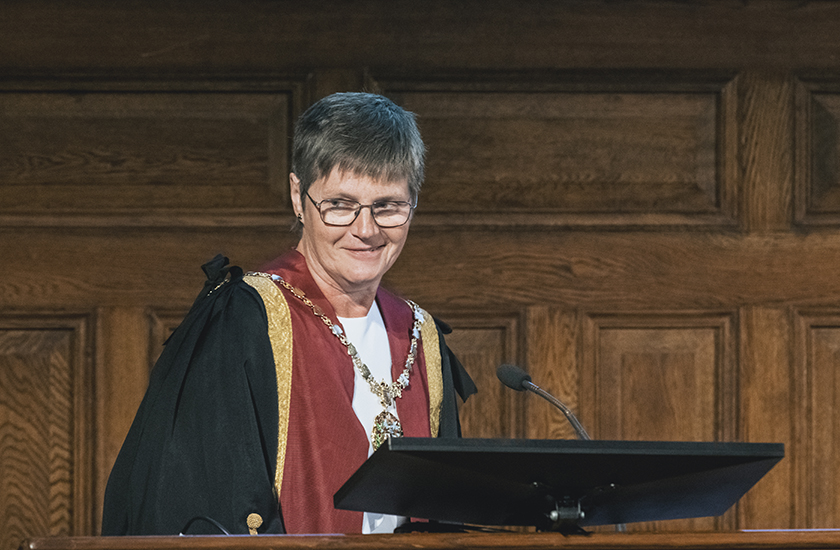 Dr Paterson (pictured) gave her address at the RCVS Annual General Meeting, which took place on Friday 7 July 2023 at One Great George Street in Westminster. On widening participation, she spoke about the fact that she herself was not from an affluent background and was told by teachers and career advisors that she would not be suitable to become a vet.
Dr Paterson (pictured) gave her address at the RCVS Annual General Meeting, which took place on Friday 7 July 2023 at One Great George Street in Westminster. On widening participation, she spoke about the fact that she herself was not from an affluent background and was told by teachers and career advisors that she would not be suitable to become a vet.
She said: “My theme [for this year] will be focussed on recruitment and particularly widening participation, as one of the three themes of the RCVS Workforce Action Plan. I want to get out during my presidential year and talk to school children and teachers, especially head teachers at their conferences, to make them aware of the opportunities that are available to a veterinary science graduate.
“I want to continue to work with the Veterinary Schools Council’s Widening Participation Vet Schools Network to make school children from all backgrounds aware, whether they are from a large, single-sex private school, or a mixed-faith inner-city comprehensive, that veterinary science is accessible to them.
“A veterinary science degree equips graduates with the appropriate skillset to follow a myriad of different career paths. For example, in clinical practice caring for people’s beloved pets or working with farmers to produce high-welfare food in an economical and sustainable way. Not to mention groundbreaking research into human and animal diseases, public health to help safeguard food security, the pharmaceutical industry to develop new and innovative treatments, and the armed forces to maintain the health and welfare of military working animals. I could go on.
“As professions, and this means not just veterinary surgeons but veterinary nurses, we need to get out there and sell ourselves to the wider public. We have made a start, but we need to become more inclusive and diverse. We need to do some myth-busting about the real requirements needed to be a vet or vet nurse. There is no doubt you do need to have good A levels to study veterinary medicine, but, beyond that, bright students from any background can join our professions. You can be a veterinary surgeon or veterinary nurse if you are black or white; Muslim or Christian; and from any socioeconomic background.”
Sue is the 12th female President of the RCVS, leading the first all-female Officer Team, comprising the now Senior Vice-President Dr Melissa Donald MRCVS, Junior Vice-President Linda Belton and Treasurer Dr Tshidi Gardiner MRCVS as well as VN Council Chair Belinda Andrews-Jones RVN who attends Officer Team meetings as an observer.
Sue qualified from the University of Cambridge Veterinary School in 1984 and, after some time in mixed practice, took her Certificate and then British and European Diplomas in Veterinary Dermatology - a subject area in which she has been an RCVS and European Specialist for more than 20 years. Additionally, she was elected a Fellow of the RCVS for meritorious contributions to clinical practice.
She was first elected to RCVS Council in 2014 and was re-elected in both 2018 and 2022. In that time, Sue has served as Chair of the Education Committee, where she played a crucial role in the introduction of a new continuing professional development (CPD) policy and the Veterinary Graduate Development Programme (VetGDP).
Latterly she has been the Council Lead on sustainability, which includes representing the RCVS and the wider professions on the UK Health Alliance on Climate Change. She has also chaired the Advancement of the Professions Committee, which is responsible for overseeing and coordinating projects such as the Mind Matters Initiative (MMI), Leadership and the Workforce Action Plan.
Sue concluded her speech (which is available to read in full) by saying that even if she convinced just a few students who had never considered veterinary science that it could be a rewarding career, then she would be happy she had made a difference in her presidential year.
AGM business
Dr Melissa Donald, RCVS President 2022-23, opened the RCVS AGM at 11am with the approval of the minutes of the previous year’s AGM and the formal presentation of the RCVS Annual Report and Financial Statements for the year ending 31 December 2022.
Members of the RCVS were given the opportunity to ask questions about the Annual Report in advance of the meeting, as well as those present being able to ask questions from the floor. No questions were received before the deadline or asked on the day of the AGM itself.
RCVS Council election, appointments and retirements
Next, the AGM moved on to the results of the 2023 RCVS Council election. Newly-elected members Dr Alice McLeish MRCVS and Tim Hutchinson MRCVS were welcomed on to Council, as was current Council member Linda Belton who was re-elected. All will now serve four-year terms on Council. Also welcomed on to RCVS Council were Dr Matthew Jones MRCVS, Veterinary Schools Council-appointed member, and Sue Howarth RVN, who will serve as a VN Council representative.
Regarding retirements, at the AGM Council said farewell to Professor Chris Proudman MRCVS, who had served on Council as both an appointee of the University of Surrey and the Veterinary Schools Council, and Dr Jo Dyer MRCVS, who had served as an elected member of RCVS Council since 2015. Also departing was Dr Niall Connell FRCVS, who had served as an elected member of Council since 2013 and was RCVS President for 2019-20, as well as being the inaugural Chair of the RCVS Diversity & Inclusion Group, and Treasurer from 2021.
VN Council election and retirements
Turning next to the RCVS Veterinary Nurses (VN) Council, the current Chair Matthew Rendle RVN, who himself was re-elected, welcomed newly-elected member Simon Williams RVN for his three-year term.
In terms of retirements, Matthew said goodbye to VN Council elected member Claire Roberts RVN and lay member Dominic Dyer.
Election of Officer Team
Following the conclusion of the AGM, there was then a short meeting of the newly-constituted RCVS Council to approve the 2023-24 Officer Team of Dr Sue Paterson as RCVS President, Dr Melissa Donald as Senior Vice-President, Linda Belton as Junior Vice-President and Dr Tshidi Gardiner as RCVS Treasurer.
RCVS Council members voted to approve the team.
CEO’s address
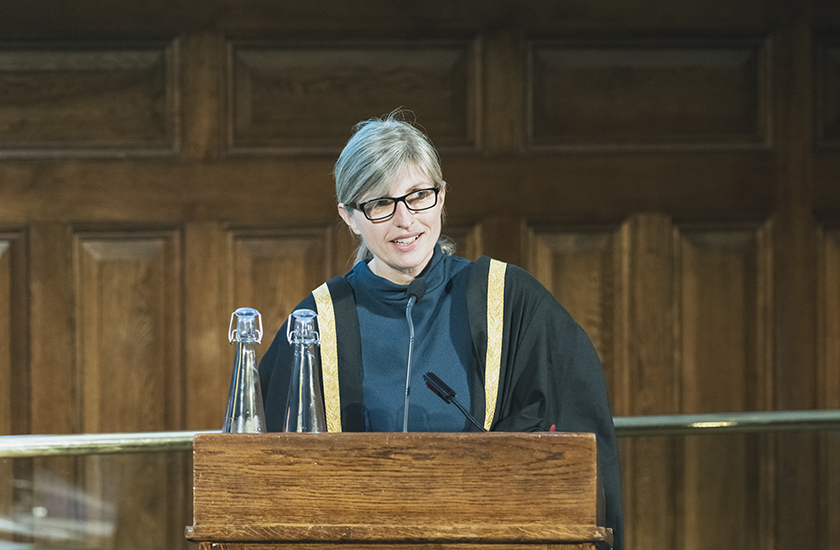 Following the short meeting of RCVS Council, our Chief Executive Officer Lizzie Lockett (pictured) then gave her annual address, providing an overview of some of the key achievements of the RCVS over the past presidential year.
Following the short meeting of RCVS Council, our Chief Executive Officer Lizzie Lockett (pictured) then gave her annual address, providing an overview of some of the key achievements of the RCVS over the past presidential year.
In terms of highlights she cited the continuing growth of the RCVS Academy, the College’s free, online learn platform, in terms of its content and users; the development and imminent launch of the Charter Case Committee, an alternative to the Disciplinary Committee for those cases where the serious professional misconduct is at the lower end of the spectrum; the publication of the Workforce Action Plan; the launch of the Practice Standards Scheme Sustainability Award; the finalising of the new guidance on under care; and a new protocol on pursuing private prosecutions for Veterinary Surgeons Act breaches by non-vets.
Lizzie said: “Our year ahead kicks off the last 18 months of our strategy plan, so towards the end of this presidential year we will be considering the shape of a new plan.
“Like the sun at sunset, we often do our best work just before a deadline, so I am expecting continued great things from the team over the next year, as our current plan draws to a close.
“There are still many things to complete within the existing plan, and focal points for the year ahead include progress on our extra-mural studies database and a review of how we regulate new technology. Our new Public Advisory Group will start to meet in the autumn, and I look forward to working with them to ensure the essential voice of animal owners and keepers is heard in our work.
The full text of Lizzie’s speech is available to read in full.
RCVS awards ceremony
Following a lunchbreak, Royal College Day reconvened for the bestowal of awards by the RCVS and its charity partner RCVS Knowledge.
The full list of awards are as follows:
- RCVS Knowledge Awards for Quality Improvement: The School of Veterinary Nursing at the Royal Veterinary College (RVC) and Dr David Charles MRCVS
- RCVS Knowledge Award for Antimicrobial Stewardship: White Lodge Veterinary Surgery in Exmouth, Devon
- RCVS Student Community Award: Sophie Oliver and Dr Legend Thurman MRCVS
- RCVS International Award: Dr Denis Novak MRCVS
- RCVS Impact Award: Dr Mark Little MRCVS and Dr Collin Willson MRCVS
- RCVS Inspiration Award: Dr Katie Ford MRCVS and Dr Laura Higham MRCVS
- RCVS Queen’s Medal: Dr Bruce Fogle MBE MRCVS
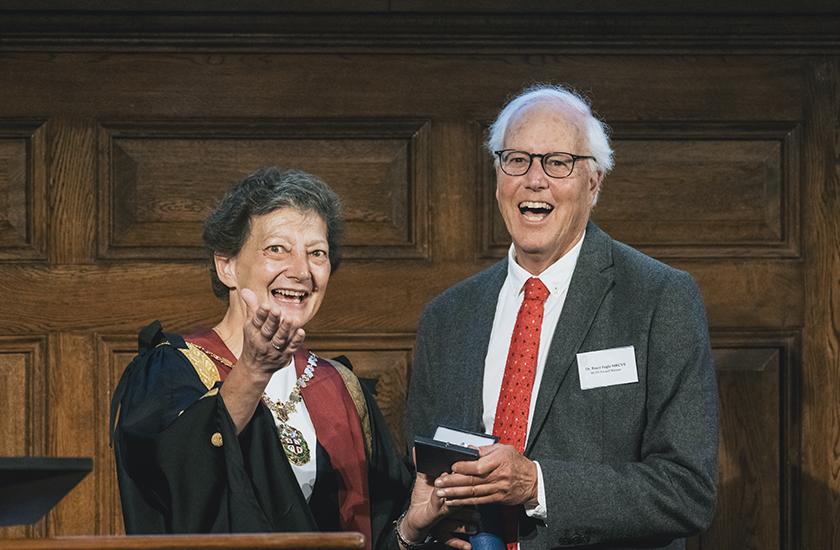 As the recipient of the College’s most prestigious award, Dr Fogle (pictured) had the opportunity to say a few words about his career in animal health and welfare and charity work, his mentors, and his colleagues.
As the recipient of the College’s most prestigious award, Dr Fogle (pictured) had the opportunity to say a few words about his career in animal health and welfare and charity work, his mentors, and his colleagues.
Further information about each of the awards, as well as detailed citations about each of the award winners, is in the Royal College Day Programme, which can be downloaded from our Publications page.
Outgoing and incoming VN Council Chairs’ addresses
Following the bestowal of the RCVS and RCVS Knowledge awards came the address from the outgoing VN Council Chair, Matthew Rendle, who had come to the end of his three-year term. In his address he said that welcoming new veterinary nurses to the Register at VN Days and university graduations had always been a highlight, as well as an opportunity to let those just coming into the profession know what the RCVS can and will do for them.
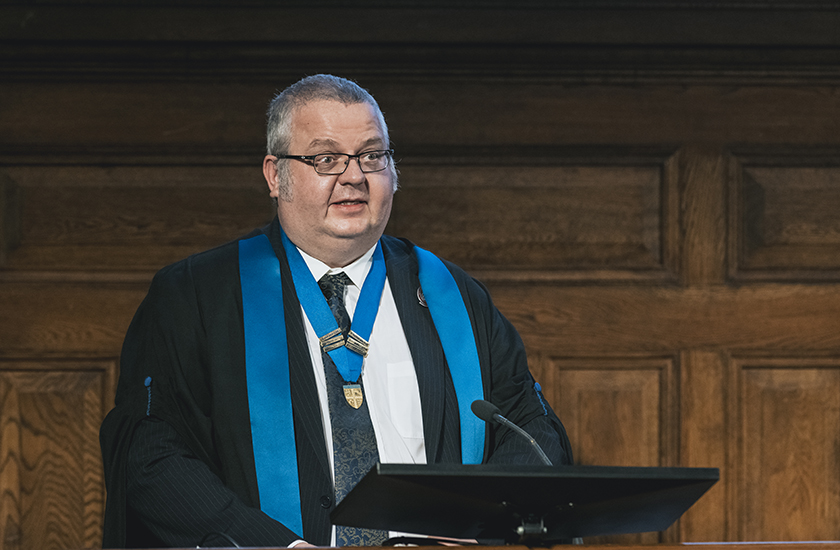 Matthew (pictured) said: “In my time as VN Council Chair, I’ve worked out that I have welcomed an amazing 1,268 nurses to the Register during these ceremonies.
Matthew (pictured) said: “In my time as VN Council Chair, I’ve worked out that I have welcomed an amazing 1,268 nurses to the Register during these ceremonies.
“They are such great events, buzzing with energy from these young men and women who have the whole world in front of them. Although I’ve been a veterinary nurse for more than 30 years, you can come out of those occasions feeling energised and with a renewed passion for what is probably the best job in the world.
“These events are an amazing chance to tell these young veterinary nurses directly that they have a bright future ahead of them with many potential career paths; to update them on all that we’re doing and planning to enhance their roles in years to come; and to talk to them about the support we can offer them.”
He concluded by reiterating his call for veterinary nurses to make their voices heard, a theme Belinda would continue, and thanking his fellow VN Council members and the College’s Veterinary Nursing Team.
Following Matthew’s speech he called Belinda on to the stage where he handed over the VN Council robe and ribbon, after which she gave her opening speech as the new VN Council Chair.
Firstly, she thanked Matthew for steering VN Council through the difficult pandemic years but also his outreach with students and newly-qualified veterinary nurses, and leading the celebration of the veterinary nursing profession’s Diamond Jubilee, including at a special event at the University of Oxford’s Natural History Museum.
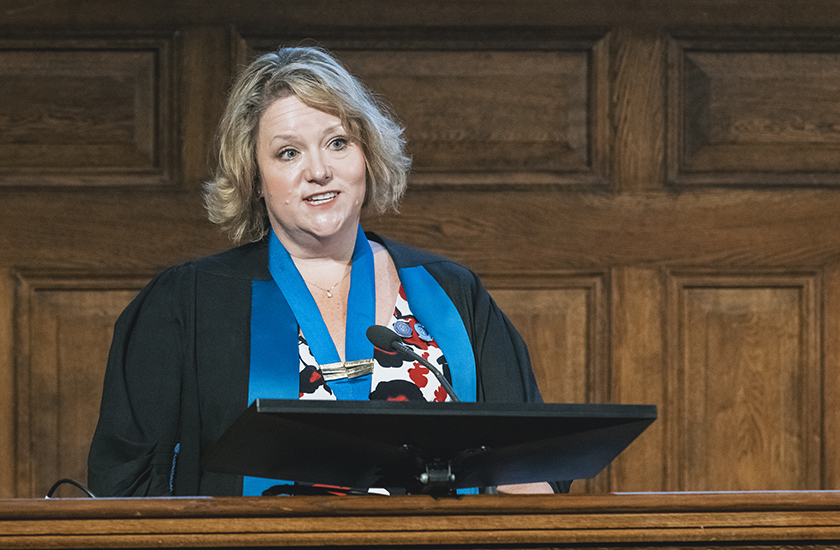 During her address Belinda (pictured) built on Matthew’s call to action for the profession saying: “I believe that if we expanded the vet nurse role we will aid retention, recruitment and reward of both veterinary nurses and surgeons. I have always thought if a human nurse can undertake certain activities in their field, why can’t we do the equivalent in the veterinary sector, with the correct training and qualifications of course.
During her address Belinda (pictured) built on Matthew’s call to action for the profession saying: “I believe that if we expanded the vet nurse role we will aid retention, recruitment and reward of both veterinary nurses and surgeons. I have always thought if a human nurse can undertake certain activities in their field, why can’t we do the equivalent in the veterinary sector, with the correct training and qualifications of course.
“For us nurses, the sky is the limit for the future, but this will only happen if we work together for change. The Dalai Lama once said, ‘If you think you are too small to make a difference, try sleeping with a mosquito.’
“Each and every one of us in the veterinary professions, needs to participate to make change in our chosen vocations. Don’t just think about what currently faces us, but think to the future of what it could look like. You may well think your impact is small, but small things can grow and make a large impact when lots of people are involved.
“For instance, if a survey comes out from organisations like the RCVS or Defra or the VMD or BVNA, make sure to answer or give feedback. As a profession we often have low participation in activities that actually help give us a voice, such as surveys or elections to VN Council. We will only gain change if we have a consensus in our professions that this change is needed, so we need your help in being heard.”
Both Matthew’s speech and Belinda’s speech are available to read in full on our website.
Outgoing President’s address
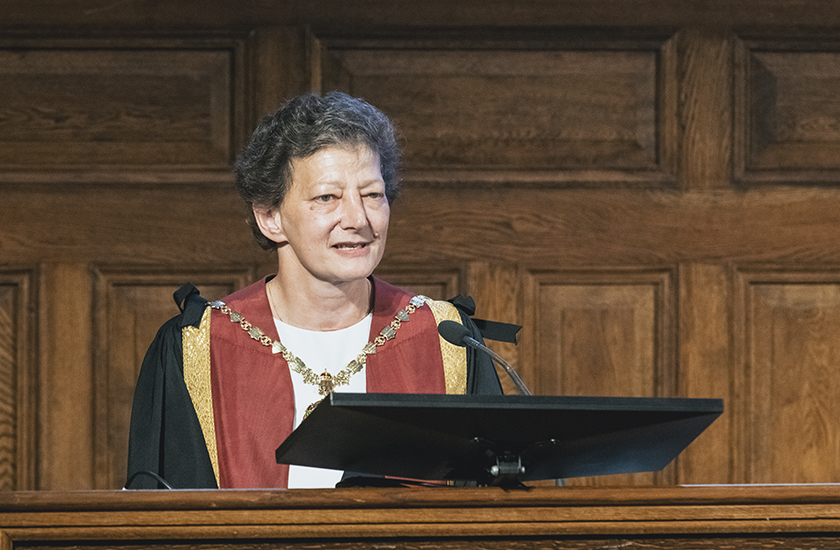 Before the formal investiture of Sue as RCVS President for 2023-24, Melissa (pictured) gave her final address as the 2022-23 RCVS President.
Before the formal investiture of Sue as RCVS President for 2023-24, Melissa (pictured) gave her final address as the 2022-23 RCVS President.
She started by saying that, at the outset of her year, she wanted to celebrate her ‘small but mighty professions’ and talk to and listen to as many members of the professions as possible, something which she said she achieved.
She said: “My travels have taken me as far north as Inverness, west to Omagh and Aberystwyth, south to Exeter and east to Cambridge and many places in between.
“They have included everything from online workshops, to our in-person Regional Question Time meetings; from webinars and panel debates, to discussions with government departments; and from chatting to colleagues over a cup of conference coffee, to the great honour of representing the professions at Queen Elizabeth’s funeral last autumn.
“I have also had the real honour to meet our embryonic vets during their first few weeks of vet school, I have spoken to final year students at each vet school and, last Saturday, I admitted the latest cohort of newly fledged veterinary surgeons to the register at Cambridge. They are all full of anticipation, enthusiasm and pride.
“What has been clear from everyone I came across is the depth of feeling of how much the majority of people care about the veterinary sector.
“I also said last year that we are small but mighty professions, and we really are. We are spread across so many sectors and there are few people, if any, untouched by the work carried out by vets and vet nurses at some point in their lives, whether they are animal owners, livestock farmers, meat-eaters, or those who have used licenced medicines. But in many ways, the professions are a victim of our own success.
“We all strive to help animal health and welfare so much, and we are stretching ourselves so thin, that the string may snap before we know it, as we often work so hard at the expense of our own self-care and wellbeing.”
In terms of what the professions can do to help themselves in terms of wellbeing, she said she wanted the professions to try and find ways to enhance their careers, build up their confidence and feel more fulfilled as a result.
“What I would like our professions to avoid is paralysis by analysis. To be unable to make a decision due to overthinking a problem, to then be so fearful of making the wrong decision that in the end you go nowhere or, the next step, making the decision but being too fearful of fulfilling it so that eventually we refer everything to someone further up the chain,” she said.
She added: “The best bit for me of being a primary care veterinary surgeon is the variety of work. If we take that away because of fear of failure, and purely become a facilitator for others to do the non-routine work, is it surprising that many of these highly intelligent young professionals are dissatisfied with their roles?
“Emptying anal glands and chatting to people as you vaccinate their pets, as important as they are, have their limitations. In other veterinary sectors there are different issues, but let’s try to look at the roles within primary care practice through the eyes of someone who has recently qualified and try to think of what support and experiences they need to stay in the profession.”
Melissa’s full speech is available to read in full.
New Officer Team
After thanking her friends and family, Melissa moved on to retirements from the Officer Team starting with Niall Connell, who was not able to attend the event, as Treasurer, and Kate Richards as Senior Vice-President.
Niall had been thanked earlier in the day for his achievements during his 10 years on Council, including his time as President, where he led the College through the early part of the pandemic with kindness, empathy and a recognition of the difficult situation it presented for the professions. She also cited the fact he was the inaugural Chair of the Diversity and Inclusion Group which, in early 2021, launched its own Strategy and praised Niall for his commitment to diversity and inclusion issues, widening participation and his openness about his own disability.
She praised Kate for her in-depth knowledge of Westminster and Whitehall, which had proven invaluable for reaching out to civil servants and politicians on the need for legislative reform and for her kindness, compassion and interest in veterinary wellbeing, which she was currently putting to use as Chair of the Mind Matters Initiative.
With that, Melissa formally handed over the presidential chain of office to Sue and, in turn, received her past-President’s badge.
Sue’s first role as new President was to say a few words about her predecessor. She praised Melissa saying: “There have been some controversial issues this year which, rightly or wrongly, have caused some consternation and challenge amongst our peers. You haven’t backed down from these difficult conversations and have put yourself front and centre in representing the College, taking the flak, tackling some of the misunderstandings and, like you said before, perhaps changing some minds.
“You’ve done all this with a characteristic sense of humour as well as humility. As someone who ran their own practice for many years, I know you’ve always been very keen on reaching out to vets in general practice, to empathise with the challenges they face and demonstrate you understand the pressures they are under.
“Your insights and experience as a general practitioner have been particularly notable at key times throughout the past 12 months, whether during the clinical career pathways meeting last autumn, where you stressed the importance of diverse and interesting careers for improving veterinary retention, or at the EFRA Select Committee on Tuesday, where you stressed the need for new legislation to help address pressures on the veterinary workforce and to empower veterinary nurses.
Next, Sue welcomed on board Linda Belton, who was not able to be present on the day, as Junior Vice-President praising her thoroughness and attention to detail, as demonstrated by her time as Chair of the Standards Committee where she has helped to explain the new under care guidance and reassure the professions on its implications and safeguards.
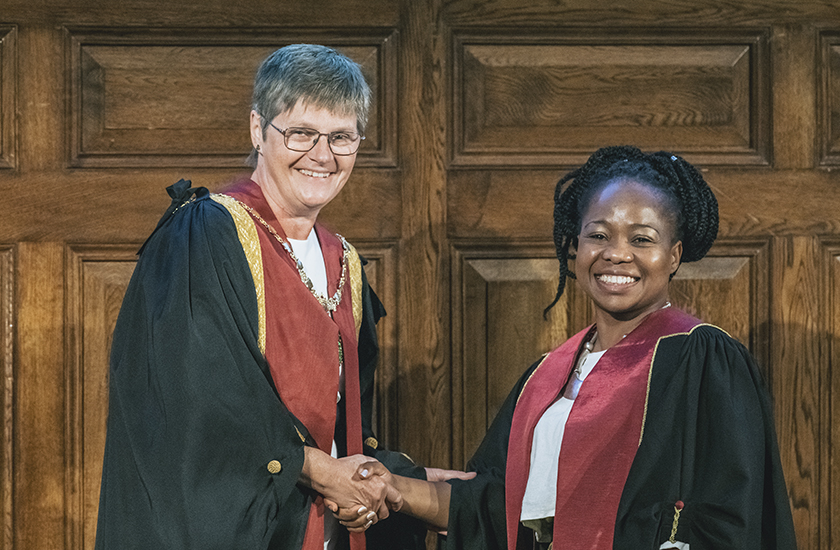 She also formally welcomed Tshidi Gardiner (pictured) as Treasurer, a role which will see her become steward of the College’s finances and responsible for the annual auditing process.
She also formally welcomed Tshidi Gardiner (pictured) as Treasurer, a role which will see her become steward of the College’s finances and responsible for the annual auditing process.
Guest speaker
Following Sue’s inaugural presidential address, Melissa introduced her guest speaker Doris-Ann Williams MBE, Chief Executive of the British In Vitro Diagnostics Association (BIVDA), to deliver her talk: ‘Antimicrobial Resistance - the hidden pandemic: A One Health Perspective’.
Doris-Ann has led BIVDA since October 2001 and has over 40 years’ experience in the IVD sector. She has been involved in a number of government steering groups and boards including the Pathology Quality Oversight Group.
In her presentation she drew parallels between the threat posed by antimicrobial resistance (AMR) and that of climate change, both being global problems that have only come about relatively recently and for which it can be difficult to make a difference on an individual and even a national level.
However, she said that there was scope for the UK government to be doing much more on AMR, particularly in reducing the prescription of antimicrobial drugs in human healthcare, and praised the veterinary professions for being ahead of the curve in terms of their antimicrobial stewardship and responsible prescribing. She also said human health services needed to make better use of emerging technologies, such as more efficient diagnostic testing and genomics in order to reduce antimicrobial use.
She concluded by saying that the veterinary professions, by taking the chance to talk to animal owners about why they’re not prescribing antibiotics and the dangers of AMR, may be in a particularly good position to drive home the message about AMR with the general public.
Following Doris-Ann’s guest speech, Melissa formally closed Royal College Day 2023.